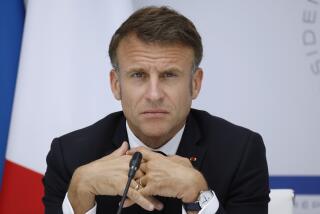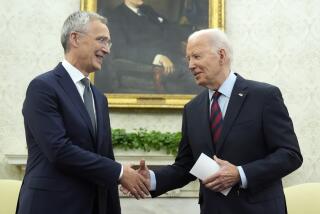As European nations retrench, the EU itself seeks a raise
- Share via
Reporting from Brussels — Governments across Europe are raising taxes, firing workers, neglecting potholes, slashing teacher salaries and shutting down libraries to atone for years of overspending.
But the new age of austerity doesn’t seem to apply to one institution: the government of Europe itself.
Even as member states stir up anger at home by imposing painful cutbacks, the European Union is set to expand its programs and its payroll next year by billions of dollars.
Launching more satellites into space, building an experimental nuclear fusion reactor and creating a pan-European diplomatic corps are among the projects expected to swell the EU’s budget, which is funded by contributions from the 27 member nations.
Some of those members are crying foul, sparking tension in a union that can often seem anything but.
“We can’t ask our members of the public to pay more here in the U.K. and have to pay more in Europe as well,” British Prime Minister David Cameron told reporters in London last month.
“It’s very important … to make sure that the European budget over time is reduced rather than increased,” Cameron added, as visiting Danish Prime Minister Lars Lokke Rasmussen nodded in agreement at his side.
Their two nations are among a group of EU states trying to draw a line in the sand over spending here in Brussels, part of a larger battle over just how ambitious and centralized Europe ought to be.
At stake is a budget that this year amounted to nearly $160 billion, bigger than the entire economies of some small European countries but, defenders note, only slightly more than 1% of the EU economy as a whole.
The fight over whether to increase spending could prove a bitter one as the region struggles to recover from its worst recession since World War II. Perhaps more ominously, it also comes as support for the grand experiment in European unity appears to be dwindling among the EU’s 500 million residents.
A recent survey found that the number of people who viewed membership in the EU as a “good thing” had fallen below 50%, its lowest rate in several years. The drop was especially stark in Europe’s economic powerhouse, Germany, where support dropped by 10 points.
Many Germans have grown disenchanted with the EU precisely for financial reasons. They resent being on the hook to help bail out countries like Greece and Spain if their free-spending governments suddenly find they can’t pay their bills.
Patrizio Fiorilli, a spokesman on budget affairs for the European Commission, acknowledged that pressing for an enlarged budget now was “very unfortunate timing.”
“Most EU member states have had to cut their budgets in a major way,” he said. “Psychologically, this is a bad thing.”
But he defended the commission’s request for a nearly 6% rise in the EU budget for 2011. Unlike some of its profligate members, the union itself hasn’t racked up a deficit. And much of its spending goes toward keeping the European economy stimulated, through public works projects and investment in research.
“It’s actually good news, because it means that EU projects are not just theory or empty words,” Fiorilli said. “The increase is all about economic growth and research.”
Nevertheless, leaders of EU nations swatted away the 6% increase and countered with their own proposal last month of less than 3%. They ruled out pay raises for staff and imposed a freeze on adding more positions to what critics regard as an already overstocked army of “Eurocrats.”
Seven countries, including Britain, the Netherlands, Sweden and Austria, voted against even the 3% raise, contending that the budget shouldn’t grow at all. The European Parliament, which traditionally supports big increases, is expected to weigh in next month, setting the stage for negotiations that are supposed to end in an agreement in November but that some observers warn could drag on into next year.
The likely outcome is a compromise somewhere between 3% and 6%.
But the dissenting nations have a longer game in mind. Going on the offensive now fires a warning shot as the EU gets ready to discuss its long-term financial plan, which will set spending priorities until 2020.
“The idea … is to give a red flag to the commission and the Parliament that this is serious stuff,” said a diplomat from one of the seven countries, who spoke on customary condition of anonymity.
Francois Roux, the chief aide to Belgium’s state secretary for European affairs, dismissed the effort to rein in spending as “a Pavlovian reflex” by countries with narrow national interests and a “Euroskeptic” view.
“For national politicians, it’s very easy to use the EU as a scapegoat,” Roux said. “But the symbolism is worrying because some countries … have a problem realizing that without a serious budget, there will be no European policy.”
Only by joining forces, he said, can Europe hope to compete on the world stage against the U.S. and emerging powers such as China and India. No single country could hope to match such behemoths in the areas of science and technology, for example. But as a bloc, the EU can maximize research funds, establish a Europe-wide patent system and foster innovation in other ways.
“We have to make sure that European citizens still have a chance to keep the system they’re living in, which gives very high guarantees of social equality and medical care and all the things we do have,” Roux said. “If we don’t stay in the international race now, we will never get back in it.”
More to Read
Sign up for Essential California
The most important California stories and recommendations in your inbox every morning.
You may occasionally receive promotional content from the Los Angeles Times.











